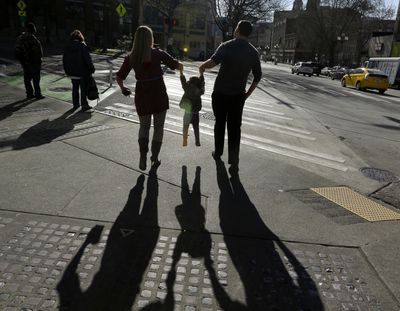Parents must file taxes by Monday deadline to receive correct monthly payments up to $300 per child starting in July

WASHINGTON – The Internal Revenue Service will begin sending families monthly payments of up to $300 per child in July, the result of a reimagined child tax credit Congress passed in March, but parents need to file their taxes by Monday’s deadline to receive the correct amount based on their 2020 income.
Washington Democrats, including Sen. Patty Murray and Rep. Suzan DelBene, who represents the northwest corner of the state, led the effort to include the tax credit overhaul in the $1.9 trillion pandemic relief and economic stimulus bill President Joe Biden signed into law March 11.
“We know that this extension of the child tax credit will benefit 1.4 million children just in Washington state alone,” DelBene said. “We’ve had so many families who have been left out of the child tax credit, so we reach those families that previously hadn’t received the full benefit.”
While the previous incarnation of the credit let parents reduce their taxable income by up to $2,000 per child each year, the lowest-income Americans didn’t make enough to qualify for the full amount. A Columbia University analysis found 35% of Idaho children didn’t benefit from the full tax credit because their parents earned too little, along with 30% in Washington as a whole and 45% in Central Washington’s 4th congressional district.
“Kids are really expensive,” said McKyndree Rogers, a 30-year-old mother of two in Spokane Valley and a member of the advocacy group MomsRising. “Not only housing, but clothes, child care … just getting the things they need for school.”
The relief bill essentially transformed the credit into a monthly child allowance for all but the nation’s highest-earning families worth up to $3,600 for children under age 6 and $3,000 for kids aged 6 to 17. Single parents who make up to $75,000 a year and couples earning up to $150,000 will receive the full amounts, with payments gradually phased out for higher earners.
A separate report from Columbia University in January estimated the change would reduce child poverty by roughly 45% nationwide, by more than 61% for Native American children and 52% among Black children.
The new payment will be sent in monthly installments from the IRS between July and December, according to the agency, and parents can claim the credit for the first six months of 2021 when they file their taxes next year.
For parents who don’t file their 2020 taxes by Monday’s deadline, the IRS will calculate payments based on their 2019 income, not taking into account any potential income reductions during the pandemic. The IRS is currently working on an online portal for parents who don’t file taxes to apply for the payments, DelBene said.
The relief bill, dubbed the American Rescue Plan Act, enacted the new credit for just one year, but Democrats plan to make the expansion permanent in legislation based on the American Families Plan the president unveiled at the end of April.
“It’s going to be really nice, but I heard it’s only temporary,” Rogers said. “So I’m kind of worried to really be (dependent) on it, because I know it’s going to be gone eventually. Like, it’s not something that I can count on for years to come.”
DelBene, who serves on the House Ways and Means Committee, which is charged with tax issues, said she is hopeful a provision making the change permanent will be included in the forthcoming bill.
“We know that kids don’t grow up in a year,” DelBene said. “This is good policy in the short term. It’s really great policy in the long term. … I’ve talked to the president directly and asked him about making it permanent, and he has supported that, so we are going to work hard to try to make that happen.”
Every Republican in Congress opposed the American Rescue Plan Act, decrying it as too sprawling and expensive, but the idea of using the child tax credit for monthly payments to parents has some support in the GOP. Sen. Mitt Romney, R-Utah, introduced a plan in February proposing even higher payments.
Other Republicans, like Rep. Cathy McMorris Rodgers of Spokane, have opposed monthly payments but worked to double the credit from $1,000 to $2,000 in the 2017 tax cut bill, the GOP’s signature legislative achievement under former President Donald Trump.